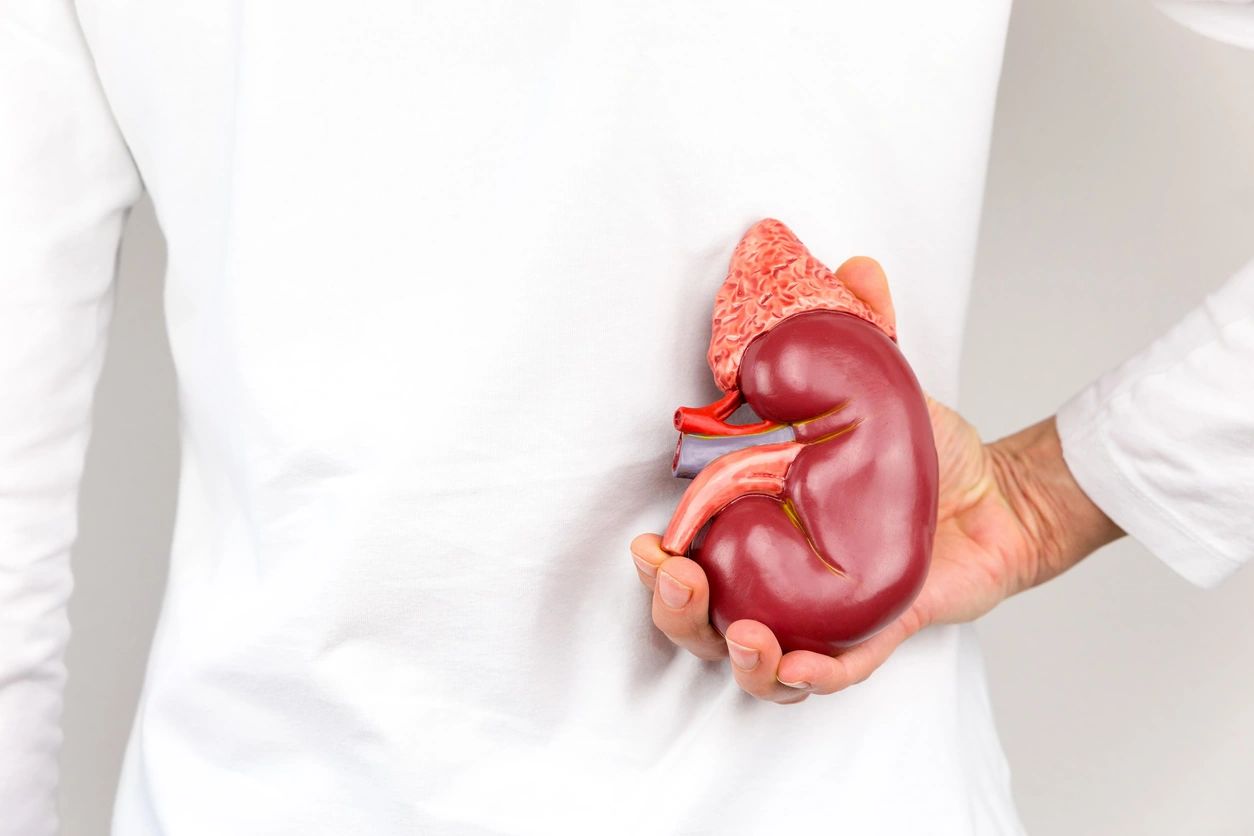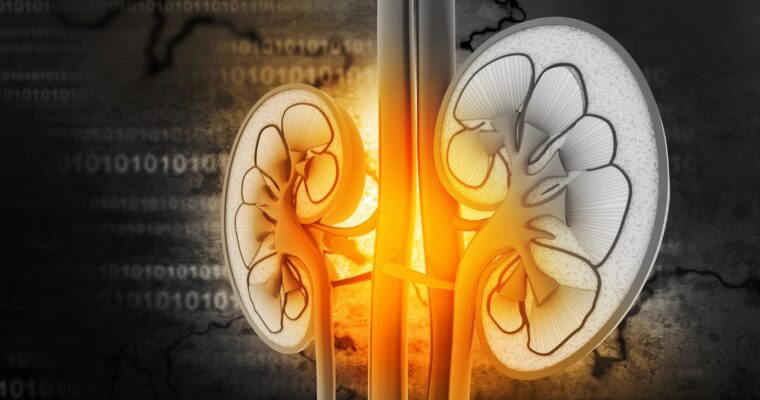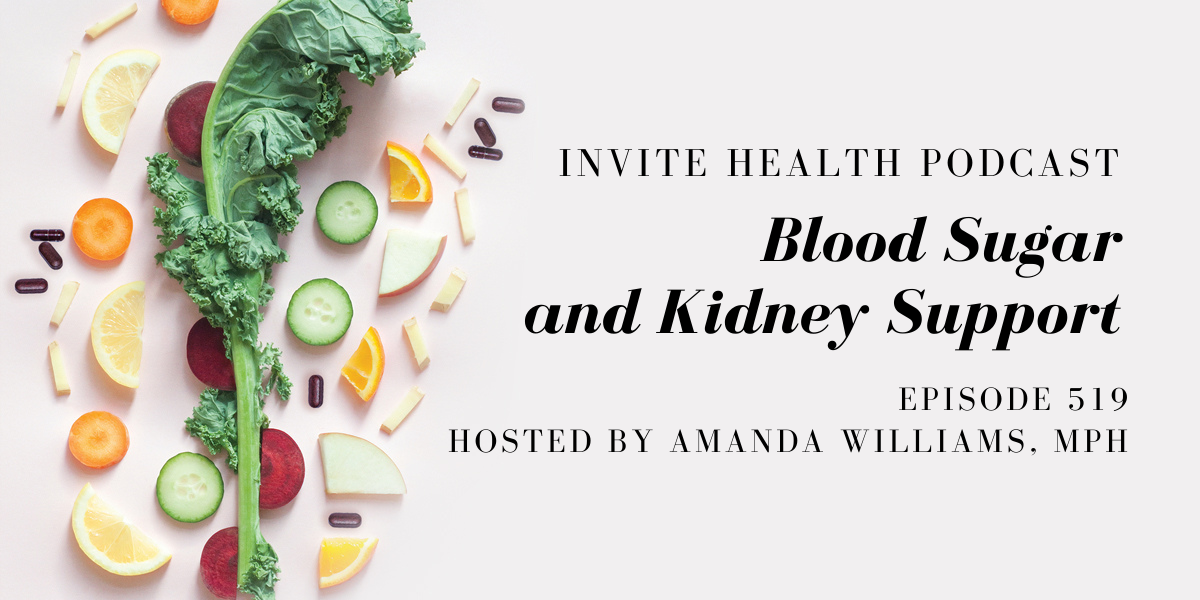blood sugar blood sugar
Subscribe Today!
Please see below for a complete transcript of this episode.
Blood Sugar and Kidney Support – InViteⓇ Health Podcast, Episode 519
Hosted by Amanda Williams, MPH
*Intro music*
InViteⓇ Health Podcast Intro: Welcome to the InViteⓇ Health Podcast, where our degreed healthcare professionals are excited to offer you the most important health and wellness information you need to make informed choices about your health. You can learn more about the products discussed in each of these episodes and all that InViteⓇ Health has to offer at www.invitehealth.com/podcast. First time customers can use promo code PODCAST at checkout for an additional 15% off your first purchase. Let’s get started!
*Intro music*
Amanda Williams, MPH:
[00:00:40] When it comes to our health, people oftentimes have concerns about their blood sugar and their kidneys. So today I want to talk about a couple of formulations that zero in on those two specific areas. I’m Amanda Williams, MD, MPH, and I want to discuss the Gluco MaintainⓇ formulation along with the Renalaid* formulation for you today.† [00:01:00]
[00:01:01] Now the Gluco MaintainⓇ has chromium in it. We’ve got vanadium in this one. There is banaba extract, there’s bitter melon extract, there’s cinnamon extract in this. There’s gymnema sylvestre. So all of the different herbal extracts that we know have been studied across the spectrum when it comes to helping to support a healthy blood glucose response are contained within this, along with those key trace minerals, including that chromium and vanadium. And then of course, we have alpha lipoic acid because we can’t have a blood glucose support formulation without having a little alpha lipoic acid, which is one of our endogenous antioxidants. Once again, we’re targeting glycation, so trying to have a good, healthy blood glucose response is essential to regulating glycation, those advanced glycation end products that do so much damage throughout the entire body, that drive up inflammation, that create vascular damage, that create neuronal damage, that alter the cellular DNA. It can basically make a cell become nonfunctioning, and that is a big, big problem. The Gluco MaintainⓇ formulation, this is the Dr. Pressman formulation that has all of those different herbal extracts, along with those trace minerals and alpha lipoic acid to really help to optimize our body’s ability to manage those spikes that occur in blood glucose.† [00:02:33]
CHROMIUM: AN ESSENTIAL ELEMENT FOR HEALTH – INVITE HEALTH PODCAST, EPISODE 444. Listen Now>>
[00:02:34] So we think about what actually is happening. So every time you eat, there is a biochemical or physiological response that occurs and we end up with this rise in blood glucose. Now what happens is we need insulin to then respond to that to help bring that glucose back down. Now, when insulin is being resistant or delayed, then that glucose can circulate at that higher level for too long. And this is when we end up with issues with those advanced glycation end products starting to, to form. So this is why we want to use a targeted nutrient approach to help to really enhance the body’s ability to drive down that elevation in glucose. So helping to wake up that insulin so that the insulin can better support healthy, balanced blood glucose. I always say you want your glucose to feel like you’re driving down a nice, smooth road. We don’t want to have all of these peaks and valleys, ups and downs. That’s not, not the ideal thing.† [00:03:45]
[00:03:46] So we can look at the the banaba leaf extract in the way that that has been studied. Interestingly enough, with the banaba extract, they have found that that’s not only beneficial when it comes to the blood glucose yielding of fats, but also that it has anti-obesity effects. Yes, the, the College of Osteopathic Medicine at Ohio University, not to be confused with the Ohio State University, but at Ohio University, back in 2007, they actually did a study where they looked at the banaba extract not only for its impact on helping to support healthier blood glucose levels, but the fact that it could have this anti-adipogenesis effect. So what does that mean? It was stopping the creation of new fat cells from forming. So this is why I always like to highlight these different formulations because I think it’s important to understand or walk away with the fact that we know that these different things that come from nature, such as the banaba extract, like, wow, that’s some really, really powerful, powerful stuff.† [00:05:01]

[00:05:01] Now the main active constituent in the banaba extract is corosolic acid, so the corosolic acid is the primary focus of the clinical research studies done on banaba and it is through that that they recognize that that corosolic acid actually helps to lower the blood glucose. There was a study that was done in the Diabetes Research Journal roughly about 15 years ago, where they were able to show that statistical difference when they did a double blind, placebo controlled trial, giving some people the corosolic acid derived from the Barnaba and others given the placebo. And they were able to see that that corosolic acid had a significant blood glucose lowering effect as compared to looking at the placebo group. Now the other interesting thing about this, because remember, I said I was talking the broad picture of kidney health as well. Well, they were able to, to determine through this study at the same time as not only was it helpful for bringing down the blood glucose, they actually found that the corosolic acid help to inhibit the proliferation of these mesangial cells, which help to protect against diabetic renal damage. So a lot of different ways in which these nutrients can help to really optimize the, the way that our bodies are reacting and responding to rises in glucose, advanced glycation end products, oxidative stress and hence this is why a formulation such as the Gluco MaintainⓇ is really just such a nice way to get that comprehensive effect that you may be looking for.†[00:06:59]
[00:07:00] So maybe you know that you have a tendency to have elevated glucose. Maybe you’ve been told that by your doctor. Maybe you test your blood sugar and you you know that after you eat, your blood sugar is way too high. So incorporating something such as the Gluco MaintainⓇ is a really nice way to optimize our pancreatic function in terms of what a normal response should be post-meal. But at the same time, we’re also yielding those multiple other benefits from having these nutrients that work on a multitude of different levels, including for the support of the kidneys.† [00:07:42]
[00:07:43] Now, I want to talk about the Renalaid* formulation. I can go into multiple details on the Gluco MaintainⓇ and all of the different nutrients that are contained within that, talk about the, you know, the gymnema and the bitter melon and all of those. But I am wanting to to cover the Renalaid* formulation because, in the big context of saying we want to make sure that we are supporting the the kidneys, the Renalaid* is a excellent way to do this. Now, it’s not just for the support of kidneys. We are also thinking about bladder support. Remember, we have the urinary tract, which includes the urinary bladder along with the kidneys. Now this formulation once again is a Dr. Pressman formula. Very comprehensive. It has D-mannose in this. Mannose, that’s the carb that is actually derived from cranberries, and this is what I always described as, it creates that slippery slope, so it makes it very difficult for any type of unfriendly bacteria to adhere with in the urinary bladder or even working its way up towards the kidney itself. But this also has olive leaf extract in it. It has fructooligosaccharides. It has this really powerful probiotic blend, so remember, we think about the microbiome. Well, we have to think about the microbiome throughout the entire body and understanding that the kidneys themselves need to have these healthy bacteria that help to stabilize once again, the attacks that occur because of reactive oxygen species, because of advanced glycation end products, and hence having the Renalaid* formulation, which provides you all of these powerful antioxidant properties along with that probiotic full spectrum, really is a nice way to optimize once again urinary tract function, which includes your kidneys. And this is an area once again oftentimes overlooked.† [00:09:49]
[00:09:51] Many times people don’t think about being proactive to their kidneys until something goes awry. Until, you know, maybe you have a UTI that works its way up and you then develop a kidney infection. So we have to always be friendly to the things that we need the most. And certainly when we think about our liver and our kidneys, those are our two primary detoxifying organs. So we want to make sure that we have nutrients on board that really are supportive to their daily functions. When you look at the Renalaid*, this is a really nice one that even if you’re not taking it on a daily basis, maybe a couple of times out of the week, is enough that really allows for the kidneys to be replenished and get that nourishment that they need, considering the taxing load that we put on them on a daily basis, especially in that setting of glycation.† [00:10:50]
PROMOTING HEALTHY DETOXIFICATION – INVITE HEALTH PODCAST, EPISODE 360. Listen Now>>
[00:10:51] So when we partner up all of these different nutrients and we look at that Gluco MaintainⓇ and we partner that with that Renalaid*, this is a multi-modal approach to really helping to create a more balanced way to target the AGEs, those advanced glycation end products, but also to really create more of this homeostasis for blood pressure, for blood sugar and for that comprehensive ability to fend off oxidative stress that can be going on throughout the entire body. So I definitely encourage you to go to our website and check out the Gluco MaintainⓇ formulation as well as the Renalaid*.† [00:11:35]
[00:11:37] So that is all that I have for you for today. I want to thank you so much for tuning in to the InViteⓇ Health Podcast. Remember, you can find all of our episodes for free wherever you listen to podcasts or by visiting invitehealth.com/podcast. Now do make sure that you subscribe and that you leave us a review. You can follow us on Facebook, Twitter and Instagram @invitehealth and we will see you next time for another episode of the InViteⓇ Health Podcast.† [00:11:37]
*Exit music*












